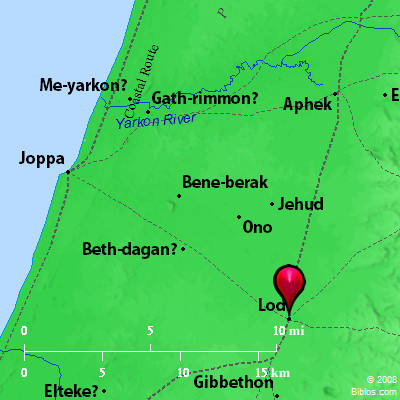Atlas  Lod and surrounding area
Maps Created using Biblemapper 3.0Additional data from OpenBible.infoOccurrences 1 Chronicles 8:12 The sons of Elpaal: Eber, and Misham, and Shemed, who built Ono and Lod, with its towns; Ezra 2:33 The children of Lod, Hadid, and Ono, seven hundred twenty-five. Nehemiah 7:37 The children of Lod, Hadid, and Ono, seven hundred twenty-one. Nehemiah 11:35 Lod, and Ono, the valley of craftsmen. Nehemiah 12:1 Now these are the priests and the Levites who went up with Zerubbabel the son of Shealtiel, and Jeshua: Seraiah, Jeremiah, Ezra, Encyclopedia LOD; LYDDA(lodh; Ludda):
1. Scriptural Notices:
Ono and Lod and the towns thereof are said to have been built by Shemed, a Benjamite (1 Chronicles 8:12). The children of Lod, Hadid and One, to the number of 725, returned from Babylon with Zerubbabel (Ezra 2:33 Nehemiah 7:37 (721)). The town lay in the Shephelah, perhaps in ge ha-charashim, "the valley of craftsmen" (Nehemiah 11:35). In the New Testament it appears as Lydda. Here the apostle Peter visited the saints and healed the palsied Arenas (Acts 9:32). Hence he was summoned by messengers from Joppa on the death of Dorcas.
2. History from Maccabean Times:
The three governments of Aphaerema, Lydda and Ramathaim were added to Judea from the country of Samaria by King Demetrius II (1 Maccabees 11:34). Lydda presided over one of the toparchies under Jerusalem, into which Judea was divided (BJ, III, iii, 5). After the death of Julius Caesar the inhabitants of Lydda and certain other towns, having failed to pay the contributions Cassius demanded, were by him sold into slavery. They were freed by Antony (Ant., XIV, xi, 2; xii, 2). Lydda suffered severely under Cestius Gallus (BJ, II, xix, 1). Along with Jamnia it surrendered to Vespasian (BJ, IV, viii, 1). After the fall of Jerusalem it was noted as a seat of rabbinical learning. The classical name of the city was Diospolis. In the 4th century it was connected with the trade in purple. It became the seat of a bishopric, and the bishop of Lydda was present at the Council of Nicea. At Lydda, in 415 A.D., took place the trial of Pelagius for heresy.
Under the Moslems it became capital of the province of Filastin but later it was superseded by er-Ramleh, founded by Khalif Suleiman, whither its inhabitants were removed (Ya'kubi, circa 891 A.D.). Mukaddasi (circa 985) says that in Lydda "there is a great mosque in which are wont to assemble large numbers of people from the capital (er-Ramleh) and from the villages around. In Lydda, too, is that wonderful church (of George) at the gate of which Christ will slay the antichrist" (quoted by Guy le Strange, Palestine under the Moslems, 493). It was rebuilt by the Crusaders; but was destroyed by Saladin after the battle of ChaTTin, 1191 A.D. It was again restored; but in 1271 it was sacked by the Mengels, and from this blow it has never recovered.
3. Identification and Description:
The ancient Lod or Lydda is represented by the modern village of Ludd, on the road to Jerusalem, about 11 miles Southeast of Yafa. It is a station on the Jaffa-Jerusalem Railway. It occupies a picturesque hollow in the plain of Sharon, and is surrounded by gardens and orchards, the beauty of which intensifies by contrast the squalor of the village. It was the reputed birthplace of George, and here he is said to have been buried. The one ruin of importance in the place is that of the church which perpetuates his name.
The town stood on the great caravan road between Babylon and Egypt, near its intersection with that from Joppa to Jerusalem and the East. Its position on these great arteries of commerce meant trade for the inhabitants. "The manufacture and repair of such requisites for the journey as sacks, saddles and strappings would create the skilled labor in cloth, leather, wood and metal that made the neighborhood once the valley of craftsmen" (Mackie, HDB, under the word). Like many other once prosperous cities on these and similar caravan routes, Lydda suffered from diversion of traffic to the sea; and it may be that for none of them is any great revival now possible.
W. Ewing Strong's Hebrew H3850: Loda city in Benjamin near Joppa |




